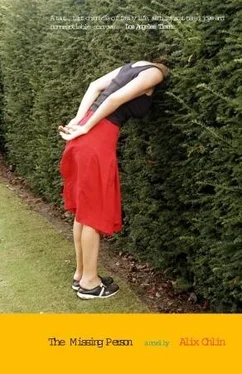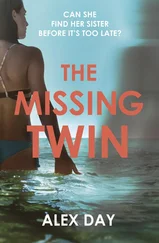It seemed like the nicest thing anybody had said to me in a very long time.
When I got back to my mother’s the condo was silent except for the hum of the air conditioner and the muted cries of sun-dazed children playing in the yard next door. I went to my room and lay down on the bed, looking at Eva’s paintings. On the dresser was the junk my mother had removed from my grimy clothes, and I sighed and made to throw it away. Loose change, a bottle cap, a matchbook, scraps of paper: the negligible archaeology of my summer. One slip of paper turned out to be the flyer from Blue Butterfly Yoga. Harold was probably in class right now, breathing deeply. I glanced at the schedule, to see whether he might in fact be there, and only then did I notice that the name of the skinny, uptight instructor was Lincoln Kent.
I sat down on the bed and puzzled this through. I’d had the sense that Harold was hiding something, and while Kent wasn’t a particularly unusual name, the yoga instructor looked about the right age.
Moments later I was driving the now-familiar route to Santa Fe, the Shangri-la billboard still promising a lush green future, though a corner of it had begun to peel away, revealing the old ad beneath. I saw a car stopped on the shoulder, and a man peeing beside it, with nowhere to hide in the open landscape and no shyness about it, either.
Harold answered the door wearing a long linen tunic and matching beige pants. His eyes were bloodshot, and his red face was crisscrossed with wrinkles and broken capillaries.
“Advanced Ashtanga,” Harold said agreeably, and stepped aside. “Would you like to come in?”
Standing in his white living room, I wasn’t sure what to say next. A glass of white wine was sitting on the coffee table.
“Can I get you anything?” He didn’t seem at all disturbed that I’d just shown up, unannounced, at his house. “Maybe a drink?”
“Okay,” I said.
He rubbed his hands and nodded, looking pleased. Any drinking companion at all was probably fine by him. He went into the kitchen and came back with another glass of white wine. It was barely noon, but I shrugged and took a sip.
“Lincoln Kent,” I said. “He’s Eva’s son, isn’t he?”
“Well, aren’t you the detective,” Harold said.
I guessed he was being sarcastic, and chose to ignore it.
He sat down on the couch and gestured for me to do the same, giving me another up-and-down look. I had the distinct feeling that he approved of the sundress I was wearing. I rolled my eyes and sat down at the far end of the couch. “Why didn’t you tell me?” I said. “And pretend not to remember Eva in the first place?”
“Because it isn’t really any of your business,” he said. “You call my house, then show up asking all kinds of questions. Some people like their privacy, and I don’t know anything about you.”
“I’m not doing anything terrible,” I protested. “I’m just trying to learn something about an interesting painter. How bad can that be?”
“I don’t know,” Harold said. “How bad can it be?”
“Is Lincoln your son?” I asked.
Harold sighed and took a leisurely sip of wine before setting his glass down again. He was shaking his head slowly, though whether in denial or disbelief at my nosy questions it was hard to say.
I decided to ask another. “What happened to Eva Kent?” I took a long swallow of the wine he’d poured for me. It tasted expensive. I put the glass down and turned my knees toward him.
He leaned back and laid his arm across the back of the couch. “Well, Eva had that postpartum thing you were talking about. We all thought she’d snap out of it but she kept getting worse. I was giving her a solo show at the Gallery Gecko, a big deal. We got all excited about it — you know, hanging the paintings just right. Little Linc was maybe a year old.”
He chuckled, fondly, and sipped his wine, on the verge of another reverie.
I suspected this was a pose designed to keep me in his living room for as long as possible; it seemed less lecherous than desperate, and I wondered just how alone he was. “So then what?” I said.
“Right. Anyway, after this depression thing Eva’d been painting these crazy pictures. She thought she could see into the future. Her work was always real sexual, but after the baby it got kind of distorted, and people started freaking out. The pictures of her and the baby — well, they didn’t seem right. This only egged her on, of course. She liked controversy. Or at least the attention.”
“What happened to those paintings? Did you sell any?”
“No, I didn’t,” Harold said. “Because the night before the opening, after we finished hanging the show, she left Linc at home and burned the whole gallery down with a can of gasoline and a book of matches. She hated herself, I think that’s why, but of course nobody knows.”
“Jesus H. Christ,” I said. “So most of her work is gone?”
“I thought all of it was,” Harold said. “And I’m not sure how your dad got hold of the ones you have. But it really was tragic. She had talent, and everybody knew it. You could just tell she was working on a whole different level, if you—”
“I know what you mean,” I said sincerely.
“Anyway, they put her in some kind of home. First they’d tried letting her live on her own, but she stopped taking her drugs and ran away to California — which is when she sent me that picture you saw. Then they got her back and stuck her in a place in Albuquerque, and she never painted again. Not that I know of, anyway.”
“And Lincoln?”
“Farmed out to various relatives and whatnot. Under the circumstances, I don’t know how he grew up to be so normal. It must be all that yoga. I go to his classes all the time. I like to keep an eye on him. Sometimes we have lunch.”
“Are you his father?” I said.
Harold snorted. “God only knows. Well, God, and Eva.”
I stared at him in repulsion.
“Oh, come on,” he said. “I’m just kidding. I’m not his father.”
“Are you sure?”
“Yes, of course,” he said, staring down at his white carpet for another long moment. “I was doing a lot of stuff those days,” he finally said. “It was a time of experimentation, of pushing boundaries.”
I nodded. “Yes, I know. I study that period. Experimentation with sexual politics, a push to be frank and honest about the body’s functions and desires.”
“That’s not exactly what I meant,” Harold said wrily. “More like drugs and drinking. .” His voice trailed off as I kept looking at him; then he added, “You can imagine the effect of that kind of lifestyle.”
I had no idea what he was talking about: forgetfulness, or promiscuity, or sloppy personal hygiene? Then I did. If you do a lot of drugs and drinking, you can’t always follow through on the body’s functions and desires. From the darkness of his blush and the fact that he could not meet my eyes I understood that he was telling the truth, and that all his sexual bragging had been just that, an exaggerated fiction.
“I know what you mean,” I said gently, almost wanting to put a hand on his shoulder. But if Harold wasn’t the father, I thought, then who was? I pictured Eva in my mind, and the vision was nightmarish: she was dribbling a can of gasoline around a room, deranged and leering, insane, while fire trucks howled outside. Putting my father in that picture with her was impossible, and yet I couldn’t stop thinking about it, either. I felt a kind of energy building inside me, a force that swam through my blood like intuition. Fragments turned and spun in my head: the disorienting paintings; Eva’s strange, grinning face; my father, who owned her only surviving work. I remembered the serious and distracted look he always had after a long day at the office, and now in my imagination this look took on a deeper, more romantic cast. All my memories were changing, shifting their forms. I saw an almost logical progression from past to present, from him to me, that was confirmed by the paintings propped against my dresser. The reason I’d felt that jolt of electricity, that lightning-bolt sense of recognition when I’d seen them, had to do the persistence of objects, the power of physical things, which were how the dead could communicate with the living.
Читать дальше












